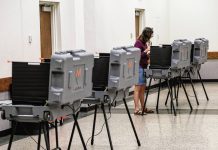Attorneys for Logan Owsley, plaintiff in a recently dismissed federal case against several current and former Bartholomew County officials about the shooting death of his father Cary Owsley, have filed a notice to appeal the dismissal to the Seventh Circuit U.S. Court of Appeals.
Trent McCain, one of Logan Owsley’s attorneys, said Monday’s filing is the first step in having the case appealed to the Seventh Circuit in Chicago. The notice does not contain any information about what grounds the appeal is based on, and McCain declined to reveal what the strategy will be in briefs that will be filed later seeking the dismissal’s reversal.
Cheryl Jackson, sister of Cary Owsley, provided the following statement by email: "I am thankful for our attorney team’s tireless commitment to finding justice for Cary. They have assured me that they will not stop fighting until all legal avenues are closed."
On April 3, a federal judge in the U.S. District Court for the Southern District of Indiana dismissed Logan Owsley’s lawsuit against eight Bartholomew County officials alleging federal civil obstruction of justice in the shooting death of Cary Owsley, a case that had been ongoing for four years.
The court ruled to enter final judgement in favor of the county officials, ruling that there was no federal jurisdiction over the claims filed by Logan Owsley involving the 2013 death of his father.
Cary Owsley was found dead at his Zephyr Village home outside of Columbus on April 7, 2013, according to court records. Then-Bartholomew County Coroner Larry Fisher, one of the defendants, ruled that Owsley’s death was a suicide.
Attorneys for the eight current or former Bartholomew County employees being sued had filed a motion to dismiss the case on May 18, 2018.
The lawsuit, which was in amended form, had been pending in the U.S. District Court for the Southern District of Indiana since April 7, 2015, the two-year anniversary of Cary Owsley’s death.
In their motion to dismiss the case, the defendants alleged Cary Owsley’s son, Logan Owsley, had no legal standing to assert any claims relating to his father’s death, based on recent state court rulings, including by the Indiana Supreme Court. The motion also claimed qualified immunity, stating the defendants did not violate Cary Owsley’s clearly established rights.
They also alleged the court lacked subject matter jurisdiction over Logan Owsley’s claims because the amended complaint failed to state a claim for which relief could be granted. Bartholomew Circuit Court determined there were no claims related to Cary Owsley’s death to be pursued, according to the motion to dismiss.
The case had been on hold in federal court while the state courts ruled on whether Logan Owsley retained standing in his father’s case after Cary Owsley’s probate case was closed in Bartholomew Circuit Court in 2016 by a special judge.
The federal lawsuit was filed April 7, 2015, by Logan Owsley in U.S. District Court against then-county sheriff Gorbett, Fisher and current and former sheriff’s deputies E. DeWayne Janes Sr., Dean A. Johnson, Christie L. Nunemaker, Brent E. Worman, William R. Kinman Jr. and Christopher Roberts.
Owsley, 49, was found by his wife, Lisa, in his home April 7, 2013, with a chest wound from a bullet fired from a handgun, police said.
Nearly four months later, three sheriff’s department deputies — E. DeWayne Janes, Dean Johnson and Christie Nunemaker — were disciplined for errors in judgment during the investigation.
Among those errors were allowing Janes, who was formerly married to Cary Owsley’s wife Lisa, to enter the death scene and remove Cary Owsley’s body from the home and allowing him to touch and secure the handgun, according to the lawsuit. Janes helped cut out a section of the rug that was blood-soaked and bagged it for disposal after investigators left, according to allegations in the lawsuit.
McCain said it could be 14 to 21 days before the case is docketed and the process for filing arguments in the case begins.
"The wheels of justice turn very slowly sometimes, but we’re still fighting," he said.




